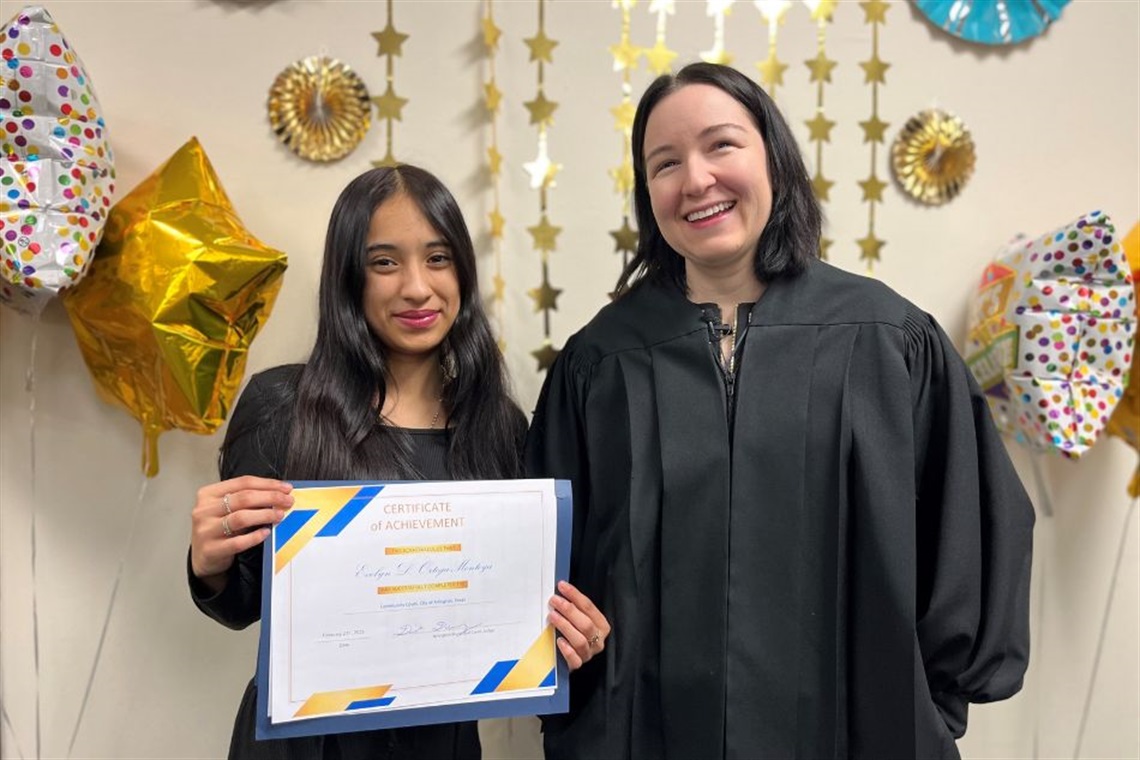Community Court Gives Second Chance to Low-Income Residents, Veterans
Published on October 02, 2025

By Susan Schrock, Office of Communication
The City of Arlington’s innovative Community Court pilot program helps eligible low-income residents and veterans resolve Class C misdemeanor violations by successfully completing alternatives such as community service, education and workforce development, counseling and substance abuse recovery instead of just paying hundreds of dollars in fines.
Launched in March 2024, the four-year, federally funded pilot program focuses on addressing underlying issues, such as financial hardship, homelessness, addiction, or limited job skills, that may have contributed to their trouble with the law. Common Class C violations resolved through Community Court include public intoxication, possessing drug paraphernalia, and driving without a valid license or insurance.
“Most people will just go and pay their fine and they’ll pay the court costs. But for some individuals, that's not a realistic option for them. They simply don't have the funds,” Associate Municipal Judge Danielle Dulaney said. “We try to give those individuals a path forward."
A Different Kind of Court Experience
Participants meet with Judge Dulaney and their case worker in a room inside the Arlington Human Service Center on Sanford Street, not at the Arlington Municipal Court. This deliberate choice aims to reduce the "fear and trepidation" some individuals feel about entering a traditional court setting, Delaney said.
"We have just a table. You sit across from me, and we have a conversation," Dulaney explained. "It’s a completely different feel. We try to be really honest with each other about what Community Court is going to look like, what the expectations are."
The program is supported by two dedicated case managers and numerous community partners, including Goodwill of North Central Texas, Texas Workforce Solutions, Recovery Resource Counseling, and the Arlington Public Library. These partnerships allow the Court to connect participants directly with tailored resources and support.
Alternatives to fines can include:
- Completing community service.
- Substance abuse counseling and recovery.
- Earning a GED or high school diploma.
- Completing English as a Second Language classes
- Improving job skills to find full-time employment.
Case Manager Mira Ademaj said her hope is that Community Court helps take away the stigma and fear some people have about the court system.
“A lot of people assume just because they didn't take care of their ticket when they were supposed to that they'll show up to the court and get arrested on the spot. But that's not the case,” Ademaj said. “And for people who can't pay, I think telling complete strangers, such as a judge or clerk, that you just don't have the money for it can feel kind of embarrassing and intimidating. But it's not. It's just real life.”
“At the end of the day, we just want people to take care of their citations and not be punished because there's circumstances in their life that kind of keep them away from paying,” Ademaj added.
Making a Life-Changing Impact
Judge Dulaney has seen the immediate, positive impact the program is having on participants, most of whom graduate within 90 to 120 days.
"We’ve had individuals who were homeless when they entered the program who now have permanent housing," Dulaney said. "We have individuals who have come to me... who have just told me and their case managers candidly that they’re having some substance abuse issues. Because we’re able to allow providers to be at every single one of our dockets, they were able to connect with somebody right then and there."
Shortly after the program launched, it expanded to include veterans as well as low-income individuals.
"It was really important to us when we started this program that we helped serve those individuals who served our country,” Dulaney said.
The program’s success culminates in a graduation ceremony, a moment that often holds special significance for participants. That includes resident Kathaleen Bates, who graduated and had her Class C misdemeanor citation related to a traffic collision resolved after completing community service earlier this year.
“The court system, the people that work for Arlington, they are your friends,” Bates said about her experience. “They want to help you as much as they can.”
Dulaney said being able to celebrate with participants at the end of the program is special.
"A lot of these individuals have never experienced a graduation before or have experienced an opportunity for their loved ones to come together and celebrate them because they accomplished something, and they did something good,” Dulaney said.
The Arlington Community Court is funded by a $900,000 federal grant from the Bureau of Justice Assistance. Arlington was one of only five cities in the United States to receive this highly competitive grant.
"People come in from all different backgrounds. Whatever challenges they may be personally facing, hearing their story and seeing them go through this process and come through it successfully, it’s been amazing," Dulaney concluded.